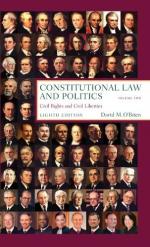|
This section contains 1,840 words (approx. 7 pages at 300 words per page) |

|
by David Davenport
About the author: David Davenport is an assistant professor in the Computer Engineering Department of Bilkent University in Ankara, Turkey.
Anonymous communication is seen as the cornerstone of an Internet culture that promotes sharing and free speech and is overtly anti-establishment. Anonymity, so the argument goes, ensures governments cannot spy on citizens and thus guarantees privacy and free speech. The recommendations of the American Association for the Advancement of Science’s conference on “Anonymous Communication Policies for the Internet” support this view. Among the findings were that “online anonymous communication is morally neutral” and that “it should be considered a strong human and constitutional right.”
This view is fundamentally mistaken; by allowing anonymous communication we actually risk an incremental breakdown of the...
|
This section contains 1,840 words (approx. 7 pages at 300 words per page) |

|




